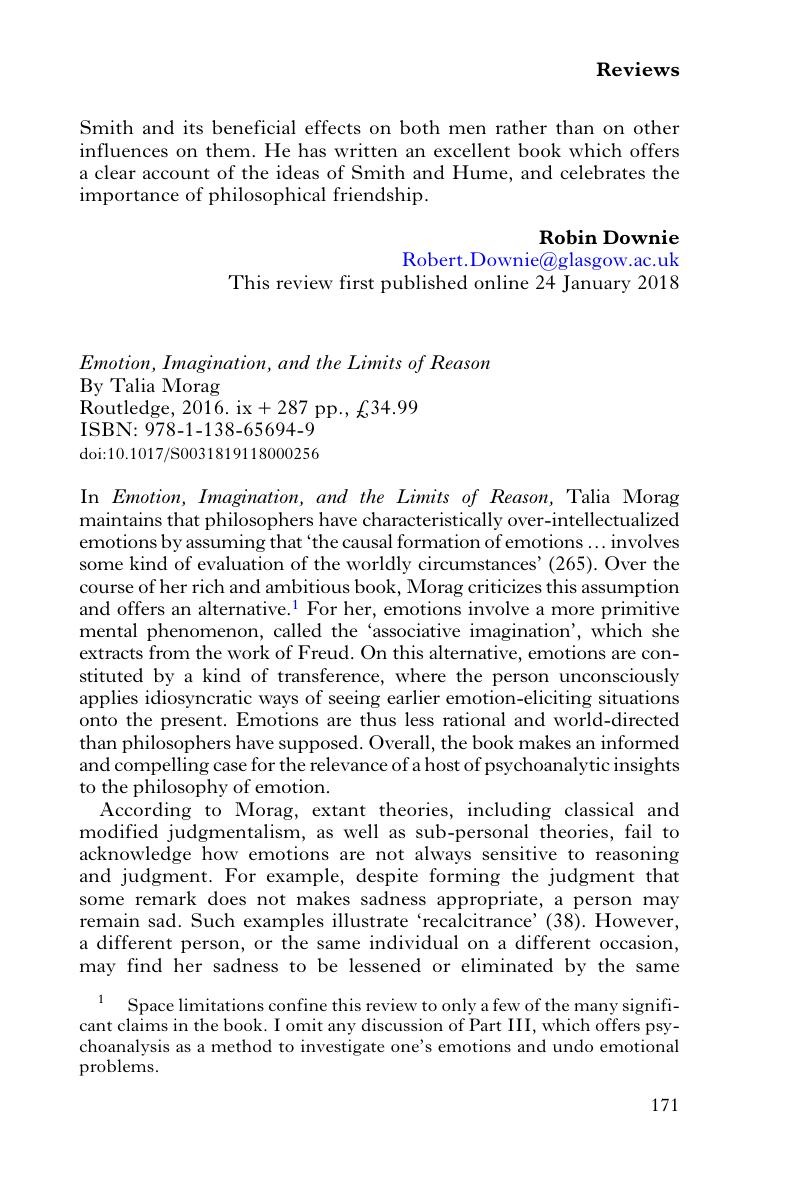No CrossRef data available.
Article contents
Emotion, Imagination, and the Limits of Reason By Talia Morag Routledge, 2016. ix + 287 pp., £34.99 ISBN: 978-1-138-65694-9
Published online by Cambridge University Press: 08 June 2018
Abstract

- Type
- Reviews
- Information
- Copyright
- Copyright © The Royal Institute of Philosophy 2018
References
1 Space limitations confine this review to only a few of the many significant claims in the book. I omit any discussion of Part III, which offers psychoanalysis as a method to investigate one's emotions and undo emotional problems.
2 See James, William, ‘What Is an Emotion?’, Mind 9 (1884), 127–43Google Scholar; Stocker, Michael, ‘Psychic Feelings and Their Irreducibility’, Australasian Journal of Philosophy 61 (1983), 5–23CrossRefGoogle Scholar; Goldie, Peter, The Emotions: A Philosophical Exploration (Oxford University Press, 2000)Google Scholar, among others.
3 Goldie, op. cit., note 2, 76–77.
4 Wollheim, Richard, On the Emotions (New Haven, CT: Yale University Press, 1999)Google Scholar.
5 See, e.g., Dretske, Fred, Explaining Behavior: Reasons in a World of Causes (MIT Press, 1988), 110–1Google Scholar.
6 The associative imagination is claimed to correspond to one sense of the psychoanalytic concept of the unconscious, while avoiding ‘a homuncular view of the unconscious as a little interpreter in the mind’ (141). Readers are unfortunately never told exactly what the homuncular view is or why philosophers would adopt it.
7 Call E indeterministic just in case, given any set of conditions, it remains possible for E either to occur or not occur in light of those conditions. Conversely, E being deterministic would mean that there was some set of conditions in light of which E was necessitated. Given those conditions, it was not possible for E not to occur.
8 Brett, Nathan, ‘Human Habits’, Canadian Journal of Philosophy 11 (1981), 364CrossRefGoogle Scholar.
9 Sigmund Freud, Standard Edition, vol. I, 319, and vol. V, 594.
10 Wollheim, R., Sigmund Freud (Cambridge: Cambridge University Press, 1971), 48Google Scholar, and The Thread of Life (Harvard University Press, 1984), 902Google Scholar.
11 S. Freud, Standard Edition, vol. XIV, 118–121, 133–135.
12 Thanks to Talia Morag for her input and to Irene Liu and Kim Frost for their feedback on the review.


